SHE is considered the matriarch of women’s sport on the Gold Coast, but Daphne Pirie is much more than that. As well as her own distinguished sporting career, the 88-year-old has helped many others along the way.
Let’s start from the beginning – where was home for you and what did that look like?
Well to start even further back. My father was a sprinter but he enlisted in the Second World War at 19 in 1915. At age 21 he had his leg blown off on the Western Front, so sport was out for him. He came home and married mum and they brought up their eight kids at Paddington in Brisbane.
Wow. Was he a good athlete? And how did that shape your childhood?
Oh yes, he was also quite good at rugby league. He wasn’t state champion but won at Toowoomba in 1914. I had his medal from that but it got stolen a couple of years ago. But then he got into sports administration. He went on to be president of Queensland Rugby League and was chairman of the Brisbane Rugby League. He was well known in sports administration, as well as you could be. Mum and dad got married in Rockhampton and then moved to Brisbane. Dad passed away in 1978.
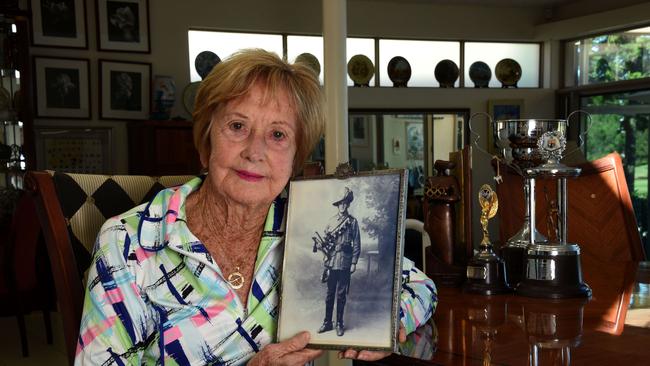
We take sport for granted at school these days but it was different for you, right?
I went to the school at Milton and we didn’t have sport. Because it was during World War II we had air raid drills and trenches. It was happening – you’d say your prayers each night. You weren’t allowed to gossip because you were told the enemy was listening.
So given we’re all living the coronavirus era, can you draw any parallels to that time?
I don’t really care for the people who stock up because we had to survive and we did. We had food stamps and Mum would trade some to get butter ones so she could make our lunch for school each day. We did what we were told but I think people are now used to looking out for themselves now. But my heart bleeds for sport, particularly the Olympics, because to be able to compete every four years and have these Olympics next year now, it’s hard.
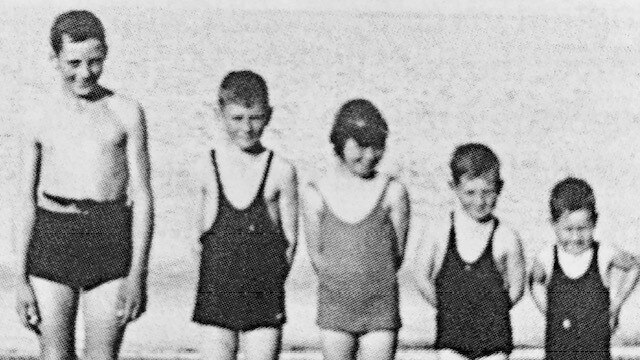
Is it the right move to shift the Tokyo Games back another 12 months?
I don’t think I’m the right person to answer that.
Through those tough times you found sport, in particular athletics. How did that come about?
I just remember going off to different championships and coming home one time to say I came third. My brothers said they were going to give me a hiding because I wasn’t telling the truth.
Were you a natural at athletics because I imagine you didn’t do much training?
No, not at all. I ended up at Brisbane Grammar in 1946 and that’s when the war ended. That’s when I got into the GPS competition. But I only went to school for two years because that’s what you did. I studied stenography at night.
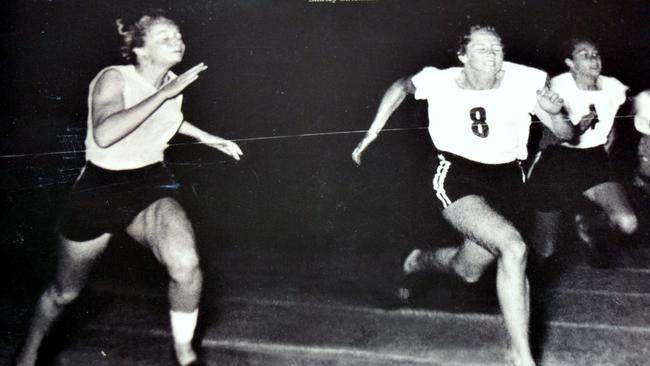
How did the world respond after the Second World War in terms of sport?
After the war we had to restart all the women’s sports. The men’s seemed to start as soon as the war ended but the women were slower.
Was there a fear back then that some sports would end? And do you hold that fear today?
I don’t know. But it’s why I was so proud to see AFLW start here – I have never seen so much money put into women’s sport. I was founding president of Womensport Queensland in 1993 but we had nothing compared to now. But I do believe all sport will start up again after this (coronavirus). But I know how hard it is during the good times to keep things going.
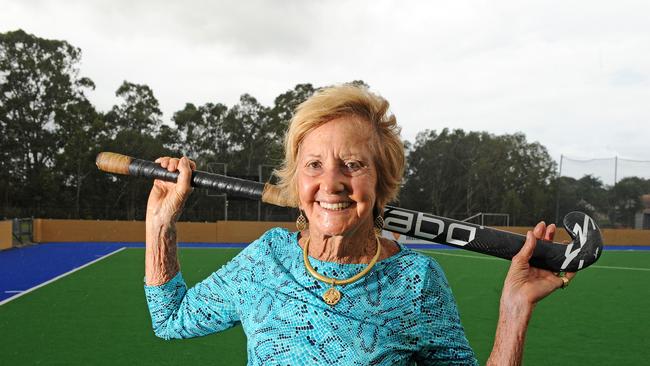
What are your views on those who say Gold Coast isn’t the place for national sport?
People sometimes say ‘you must be so disappointed (with the lack of success)’. But we have everything we need and progress is coming. I said to the Suns girls ‘don’t rely on help from Brisbane’. They said ‘we have half their team’. I said ‘you definitely won’t get it now’.
What was women’s sport like when you were competing, and how has it changed?
There was little but it was there. And there was a lot of competition. In hockey Burleigh against Southport and Labrador, it was murder – they hated each other. But that was OK because it means they were competitive. I also started a basketball team at Burleigh.
You helped start a lot of things. Was your motivation simply that you thought it was the right thing?
I just thought there was a need. All you had to do was talk to people. Slowly we got fields and the Gold Coast was a good place, better than in Brisbane.
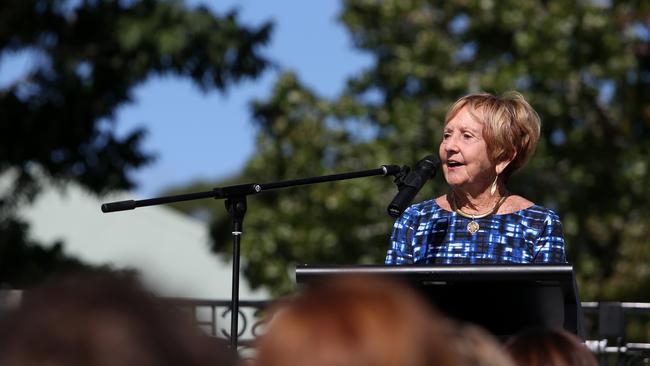
Did you hit many hurdles, in terms of people trying to halt women’s sport?
Not really but a lot took no notice of us. Some didn’t help too much and I remember getting (sponsorship) help from this Chinese restaurant who gave us t-shirts. I remember my mistress at school when I was leaving saying ‘don’t you worry about all this silly sport, you’ll get all the exercise you need with the broom’. I didn’t dare say anything. But it turned me off housework.
So it’s safe to say that the legacy you have helped create is what you’re most proud of?
I haven’t created that, but sport does bring you together. The Suns asked if I could come and talk to the AFLW side and I said ‘I don’t know what to say’. They said they wanted to know how we got things started (for women’s sport). I’m staying loyal to my dad and rugby league but it’s fantastic what the Suns have done and I have never liked those biased for their own sport. I like to help all sport.
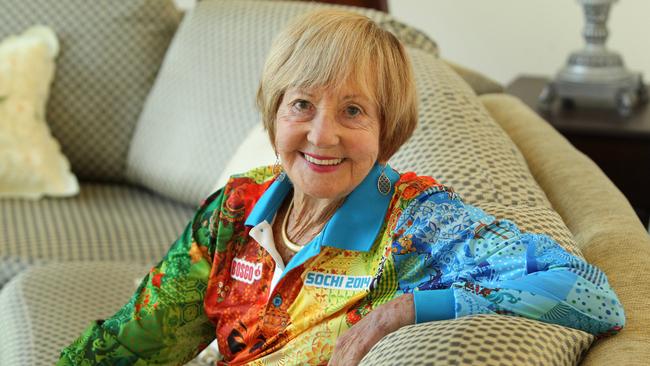
How old were you when you got into hockey and what were the challenges you faced given you were working too?
I would have been 20 in 1952. We liked the look of the Valley hockey boys so we started a girls team. I was still running in athletics championships every second year and going away with the Queensland hockey team every year. You couldn’t do that now. We were pretty much staying fit for athletics by playing hockey. We’d fit in training where we could and I’d catch the train home at night and mum would have dinner in the pot. It was stewed to nothing but it was still food. But that’s how it was.
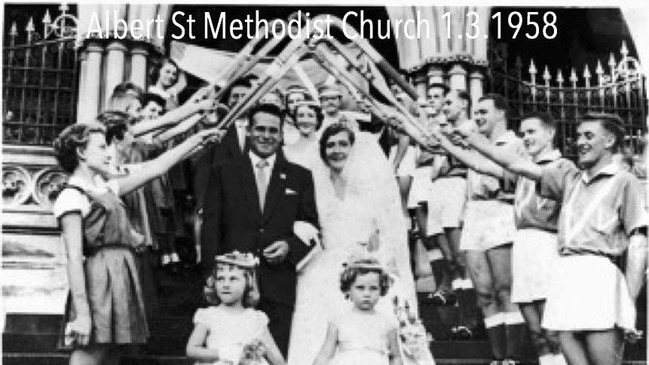
What were your aspirations during that time? Olympic Games or anything?
No, no one talked about that. I remember the night I made the Australian hockey team in 1955 and I called dad and told him. He said ‘I’m proud of you’ and then hung up. We weren’t allowed to skype. That’s something that stuck with me.
You got married in 1958 and gave all that sport away. It was just the done thing, right?
With athletics it was getting too hard. I got third at the Australian Championships in the 400m in 1956. Then I thought I’d concentrate on hockey. Then I got married and they don’t pick you once you get married. There were some powermongering women but that’s the way it was. I ended up getting into golf and masters athletics. I became president of Queensland Hockey and it wasn’t the done thing to play, it was seen to be below the office so I stopped in 1962.
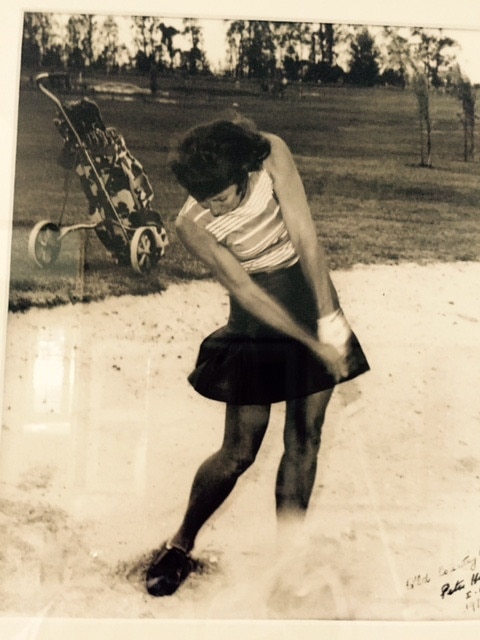
You mentioned your late husband Mick. How did you both end up on the Coast?
We were living in Brisbane and got married there in 1958. We went on our honeymoon in his FJ Holden and put a back on the utility and camped on there. When we came back we went straight to the Coast because Mick was building and we had our house half built at Burleigh and we never left.
You were pretty good at anything you turned your hand to. How’d the golf go?
I got the handicap down to single figures and I stayed there for a decade. I played at the Australian Amateur Championship for women and got through to the quarter-finals. But I was a hockey player playing golf. Then Mick and I decided to go back to masters athletics.
Of all the sports you played was there a personal favourite and if so, why?
I think athletics. It’s the basis of all sports. If you can run fast you can play hockey, if you can jump high you can play Aussie rules. Even now if I smell freshly cut grass I want to start running.
Was there a sport you didn’t try that perhaps you wished you had the chance to?
Not really. I don’t know if I would have liked rugby league. Aussie rules looks good, it’s just a pity they have those tussles on the ground.
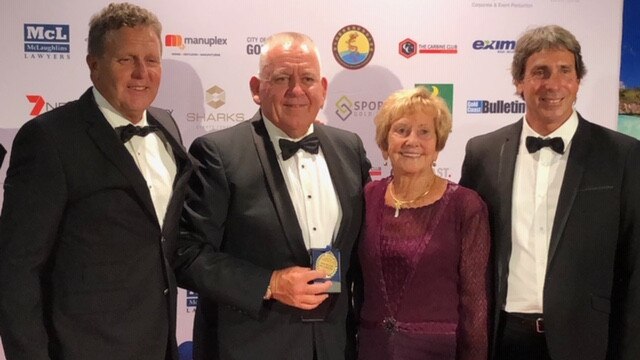
You must have had some amazing career highlights but is there a favourite in there?
I’m not a Marjorie Jackson; I was a jack of all trades. But the highlight, while it wasn’t on the sports field, would have to be in 2011 I went to the IOC headquarters in Lausanne and got the International Women and Sport trophy. I was the first Australian. That was good.
PROFILE
Age: 88
Lives: Royal Pines
Family:
■ Sons David, 60, and Robert, 56. Husband Mick (died 2016)
■ Dad Arthur George Norman Taffy Welch, mum Mary, siblings Ron, Evan, Colin, Ken, David, Nola, Robert
Daphne’s idols: “(Swimmer) Esther Williams was beautiful. And Margot Fonteyn, a ballet dancer. They were mine because sport wasn’t a big thing in our lives. I also loved (Olympic champion) Shirley Strickland – I ran against her and beat her once. And Marj (Jackson), we’re really good friends now because she could always beat me.”

Add your comment to this story
To join the conversation, please log in. Don't have an account? Register
Join the conversation, you are commenting as Logout
100+ Names: Gold Coast’s finest student athletes of 2025
From Paralympic medallists to world record holders, these Gold Coast students are achieving extraordinary sporting feats while juggling their studies.
150+ names: SEQ’s most exciting sport teams we watched in ‘25
The Sunshine State’s finest: Here are the most exciting school and club sporting teams in South East Queensland that we had the pleasure of watching in 2025. See more than 150 names and pictures inside.